#memoir method
Explore tagged Tumblr posts
Text
lil twist on the "movie star role"/"memoir method" for visualizing a dream life - another suggested method for the manifesting hotties
spoiler: this may help you figure out what techniques are right for you!
disclaimer: remember that these methods and techniques are just tools to get your mind saturated with thinking in your favor, stay grounded in the basics of the law and have fun with the varied tools!
I love the "movie star role" method. For those who don't know, it's a lil visualization technique where manifesting baddies act as if they're preparing to play the role of X. So if you want to be your SP's girlfriend, they "prep" for the role by living in the end state of already being SP's girlfriend. This includes embodying the attitude, saying affirmations like "I love being in a committed relationship" or "SP changed soooo much to gain my trust. We're so happy now!". Some baddies take a step further and apply it to their self-concept (this is genius btw) and begin saying affirmations like "I'm so beautiful and unforgettable, it is really not that surprising he came back begging for me. Giving him a chance was only fair with how much he groveled!"
Now, enter the "memoir method". This is usually a scripting technique but give Gigi a sec to explain! There are many variations of this method but it's essentially writing the reality you want to happen and putting the date in the future aka the deadline you wanna experience this by. Most encourage baddies to write in the past tense like "I'm so grateful I received enough money to cover my vacation, my bonuses keep increasing."
Now enter Gigi's lil twist on these methods - COMBINE THEM INTO WHAT I LIKE TO CALL:
The Interview Method
Imagine being interviewed by other loass baddies asking you "How did you achieve this?"
Visualize your dream self, the ultimate version of you that would warrant this type of attention and the answers that version of you would give.
Imagine an older Beyonce giving the "tell all" interview of a lifetime - THAT LEVEL OF HYPE.
Gigi's example:
I know I look glamorous and ageless. My skin is smooth and clear, my hair is long, inky black, blown out and curled. My body looks like an advertisement for hourglasses. The dress I'm wearing is flattering, accentuating my curves. I'm as sexy as I am elegant. The interviewer looks on with eagerness, practically spilling over with admiration.
"The Law of Assumption girlies wanna know Gigi, how the hell did you get results like this? Hollywood actresses would get insecure being in the same room as you! What are your methods? What's your daily routine?"
Now this is where the spoiler comes in! WHAT COMES TO MIND IMMEDIATELY? WHAT METHODS WOULD YOUR DREAM SELF LIKE?
bc guess what reader? all the answers are within you. your job is to let them out. coax them out with these exercises. feel empowered.
if your first reaction is: Idk Gigi. I don't know what methods work for me.
My answer to that is: then this technique is not for you. This method favors the baddies who are more familiar with the different modalities of manifesting. I encourage you to go and explore different things. Try them out. See which ones you like and then circle back to this and think about which ones resonated with you.
I encourage you to write it out. Script it as you visualize.
My own experience:
From this method I learned that my subconscious viewed my dream self as someone who was very disciplined and consistent. So I started to include these in my daily affirmations (I am disciplined, etc.). I realized that my dream self would let this quality seep into every facet of her life. I'm big into makeup and skincare so I thought, my dream self would probably affirm out loud or in her mind as she looked in the mirror and did her routine.
then the lil interviewer popped up in my head: "What happens on the days you don't feel well enough to do your routine?"
My mind (thinking in its favor) immediately went: that's rare that I don't have the discipline to stick to my routine so if I'm sick or in an emergency, I would just do a basic routine and play an affirmation tape.
I came to the conclusion that Dream Self would
be reliable
come across as intelligent - immediately
pride herself on good self-care
have a healthy relationship with SP
have friends who knew the law and would be encouraging
be calm and have a calm energy bc she knows everything is in her favor
be seen as a caring, beautiful, deep soul with much to give
never be taken for granted
always be spoiled by life - wealthy in finance and health
I also reversed this method: what would my Dream Self NOT do?
Dream Self wouldn't
talk badly about herself
put others down
get bothered by the 3D
surround herself with people who have limiting thoughts
be lazy
think that the worst would happen to her
This is the type of inner convo I want more loass baddies to have with themselves because it's important to be clear WITHIN yourself what you WANT.
and remember to have fun. Include questions about the silliest things like your favorite lipstick or fav playlist or opinions about dumb tv shows. One of my favorite visualizations is me telling the interviewer that I watched all of Sex and the City and that I vowed to never be a Carrie LOL.
okay, happy manifesting loass baddies!!
xx, gigi
#gigiwrites#memoir method#loassblog#law of assumption#loassumption#loass#manifestation#affirm and persist#affirmations#self concept#manifesting#neville goddard#reality shifting#desired reality#life#robotic affirming#manifesation#law of manifestation#master manifestor#specific person affirmations#positive affirmations#affirming#affirmdaily#affirmyourlife#affirmyourreality#edward art
92 notes
·
View notes
Text
The Practical Guide to Getting Out of the Friend Zone, by Beatrice Adeline Silva
Happy Ace Week! This might seem like an odd fic to promo on Asexual Awareness Week, just going by the title, but it's one where I very clearly made Beatrice demisexual without actually intending to. I didn't realize this until a friend pointed out to me that Beatrice has no interest in sex for its own sake, except with Ava, and only does it to improve her ability to give Ava pleasure if and when they finally get together, and I said "oh. OH."
Anyway. Here's a fic written entirely from the perspective of Beatrice Silva as a memoir to her college years, specifically the semester when she finally got together with the girl of her dreams.
#warrior nun#avatrice#ava silva#sister beatrice#ava x beatrice#fanfiction#warrior nun fanfic#a practical guide to getting out of the friend zone#college memoir au#alms writes#background camilith with a little something extra#this is a comedy but I actually stand by Beatrice's methods#you can use this in real life#asexual awareness week#demisexual beatrice
49 notes
·
View notes
Text
i am perhaps more amenable than a lot of people to the characterization of history as 'fiction', but that's because i think the really strident knee-jerk denial of that concept leads to a lot of weird appeals to objectivity or platonic truth or normative/pseudo-scientific forms of historical writing as un-stylized, or un-aesthetic. and i think all those reactions can lead to a very complacent and unintentional engagement with history as a discipline.
#like i think it is worthwhile to extend the questions of style intent and intervention#that are brought from foucault and historical methods that explicitly engage with fiction/literature such as memoir and critical fabulation#or even speculative history#to more quote unquote standard forms of historical writing#because it exposes a lot of the mechanisms of what histories do and why accepted historical narratives have gained the connotations/context#they have#oh and also!!#i think it is weird to welcome critical fabulation as method#while denying its critique of the quantitative historical methodologys it is reacting to and the historiographical contexts#(emotional political stylistic historical)#they created#anyway. i say that and also use those methods#which i think is fine. sometimes they're helpful.#but it is not just a methodology it is a style!!#w.me
8 notes
·
View notes
Text
This is an amazing episode of television
This is How to Get a False Confession 101
#Watching the interrogation ep of Homicide Life on the Street#I know it's based on cop memoirs#and this is that shitty interview method every cop's been taught#for however many decades
3 notes
·
View notes
Text
I listened to "being human" from steven universe future again after so long time. and remembered how huge it was that steven left beach city at the end. that he got to leave and go find out who he is, without all… that.
and lately i've been reading books by people growing up in crazy environments, who make it out and gain new perspectives, slowly realising how fucked up everything was. that their parent might have had undiagnosed mental illness, that they were carrying way too much responsibility at a young age, or just that their living conditions were not normal.
i'd really, really love to read that book written by steven. written decades later in his life. after he has had time to be angry about it all and to come out from the other side, having made peace with it. i'd really, really, really love to read it. a memoir by steven universe.
#some books that come to mind:#tara westover educated#jennette mccurdy i'm glad my mother died#edouard louis an escape method#i read them in finnish so the titles might be different i'm not googling them rn#but yeah#i want to read a memoir by steven so bad#steven universe
8 notes
·
View notes
Text
Finding my coping mechanisms has been a journey but I've finally discovered them! My three are cooking, reading, and working on small projects. When I cook or read it takes all of my concentration so my anxiety and overthinking are put on the backburner. I've taken up knitting recently and it too has helped me in a tremendous way. I'm curious what your coping mechanisms/skills are?
#adhd#neurodivergent#coping methods#coping skills#knitting#cooking#reading#I really like graphic novels and memoirs
5 notes
·
View notes
Note
isabella gets to go on a dragon expedition! good for her
Isabella is out here living my DREAM! let me come with you please please please. but also, kudos to her for realizing the limitations placed on her because of her sex and finding a way to make herself useful enough (e.g. through her drawing) that she can squeeze her way onto a dragon expedition in spite of the prejudice she faces. she took up drawing and stuck to it in the off-chance it could make her beneficial and it worked!!
also don't worry I haven't forgotten about the pictures I owe you!!
#the memoirs of lady trent#quil's queries#morethanfantasy#i'm gonna see if I can keep track of where you are in the story and send photos accordingly. like when you'd encounter them#but if you'd prefer I could just send them all at once per book#though I do believe there'd be. a bit of spoilers in that method#but I think you said you don't mind spoilers...?#anyway. up to you!
2 notes
·
View notes
Text
Oh, btw, I would never have noticed that and never did, until it was pointed out:
For example, she herself is Mary, the king’s awkwardly placed oldest daughter who is banished from his presence together with a rejected, painfully dignified spouse (Katherine of Aragon). She is also Elizabeth, another unwanted but ultimately triumphant (if sterile) daughter who, at a stroke, lost a parent (Anne Boleyn) as a child. Mantel’s mother, of course, is Henry, the books’ capricious, death-dealing sovereign, and Jack is Anne Boleyn, the sallow Protestant parvenu. But Mantel’s mother is also Boleyn: small and catlike in her movements, unscrupulous and shape-shifting. Cross-referencing Mantel’s memoir with the novels, the reader encounters the same clusters of descriptors again and again, shared out among Mantel’s mother, Jack, and Anne Boleyn, or among Cromwell, Mantel herself as a child, and Cromwell’s small daughter, Anne. Sometimes a phrase or sentiment from the memoir is lifted virtually unchanged into the novels, as when Mantel’s mother and Jack, like Henry and Anne, are described as “[the] couple who had endured, to be together, so much adverse public opinion.”
#i cannot imagine an AW memoir so let's just not put that into the universe...#fsjdkfjs 'my stupid teachers not recognising my brilliance and then those stupid Trendy Teaching Methods (TM)#honestly this is one of the best crit reviews of mantel. if my feelings about mantel were not so ambivalent/mixed#(maybe esp so that i feel like she's sort of being whitewashed in retrospective eulogy)#if mantelites had any chill...i would probably post more quotes from it jsgbfhsfd
5 notes
·
View notes
Text
So having read a bit about North Korea (really recommend Without You There Is No Us for anyone who is curious; fantastic piece of investigative reporting by a Korean American journalist), this was immediately weird to me.
In the notes, OP says that the UN rule preventing citizens of the DPRK from traveling abroad is UN Resolution 2397. So I looked it up and read the whole thing.
First thing that jumps out is that this was passed in 2017, which...the North Korean government has prevented citizens from traveling except under very specific circumstances for decades; this is, in fact, a huge point of pain for people on both sides of the 38th parallel, many of whom were permanently separated from their relatives. Over the last 40 years there have been some supervised visits allowed, with participants chosen by lottery, but even that has been sporadic. Some families have been able to exchange letters or pay brokers in China to facilitate communication, but others have never seen their relatives again.
The idea that freedom of movement has only been restricted for citizens of the DPRK since 2017 is bonkers. But I suppose it's possible there were past resolutions that said something similar, so I press onwards.
The resolution is only 11 pages and most of it deals with cutting off the sale of goods, especially petroleum, to the DPRK in response to its latest nuclear missile test, which took place in violation of international law.
In addition, the resolution does indicate that member states should not allow DPRK nationals to work in their country for the purpose of earning money that supports the illegal missile program and should "repatriate to the DPRK all DPRK nationals earning income in that Member State’s jurisdiction and all DPRK government safety oversight attachés monitoring DPRK workers abroad." This applies unless the person has dual citizenship or is a refugee.
As an aside, it is kind of funny to see references to government attaches monitoring citizens working abroad in a document that is being proffered to support the idea that the DPRK is totally chill with people going abroad.
And it's worth pointing out that Amnesty International reports that a lot of workers from North Korea who work abroad are actually forced labor whose salaries are confiscated by the DPRK to fund government operations. So like, these people are not freely traveling to other countries for work and they are materially aiding the illegal weapons program, even though they don't have much choice in the matter.
But even ignoring that, this document really doesn't support the idea that the UN --- which actually is a more or less democratic institution by the way, unlike the DPRK which emphatically is not --- is somehow the reason North Koreans cannot travel abroad.
They can't travel abroad because the North Korean government places huge restrictions on their ability to do so and has since 1953. This is just a fact.
Yes, the way people in the West talk about North Korea is not good. However, that is mostly because people like to make it out to be either kooky or innately evil --- whereas the reality is that North Korea is a brutal dictatorship that places heavy restrictions on its citizens. It is neither kooky nor evil; it is a country that is the unfortunate victim of 70 years of totalitarian rule by a single family willing to go to extremes to maintain their grip on power.
According to Amnesty International:
citizens in the DPRK are not allowed to criticize the government or read or watch "reactionary" content,
the country in 2023 implemented new restrictions meant to limit South Korean-style speech, and these crimes are theoretically punishable by execution in order to "'break the spirit' of those 'polluted' by South Korean language and culture."
forced labor still appears to be common, including labor by children in industrial settings
some of this forced labor, again, includes people sent by the government to work in China or Russia whose income is then confiscated by the state and whose movements are controlled while abroad
arbitrary arrests by law enforcement are common as a way to suppress dissent
prison camps for dissenters and critics of the government appear to still be operating
You can criticize the way people in the West talk about and think about North Korea --- and the way American foreign policy has made the situation there worse at times --- without caping for a dictatorship.
The Democratic People's Republic of Korea is not democratic; it's not a republic; it's not even actually communist. It's a totalitarian state ruled by a brutal dictator for his own benefit, where people suffer as a result of his regime.
Refusing to acknowledge that is tankie shit.
really turns me into the joker hearing people be like "oh citizens of the DPRK can't travel to other countries or work, they're all trapped there" when that was literally a UN thing. like the UN is the one who decided that not the north korean government.
#method speaks#really do recommend the book#it was marketed as a memoir#which is bonkers#it's some gripping investigative reporting
5K notes
·
View notes
Text
🟢🇫🇷 MEMOIRE ET HYPNOSE? Hypnose DCS unique au monde

View On WordPress
0 notes
Text
Ancient Greek Women Mathematicians you didn't know about

Αίθρα - Aethra (10th - 9th century BC), daughter of the king of Troizina Pitthea and mother of Theseus, knew mathematics in another capacity unknown to many. So sacred to the beginnings of the most cerebral science, Aethra taught arithmetic to the children of Troizina, with that complex awe-inspiring method, since there was no zero… and the numbers were symbolically complex, as their symbols required many repetitions.
Πολυγνώτη - Polygnoti (7th - 6th century BC) The historian Lovon Argeios mentions Polygnotis as a companion and student of Thalis. A scholar of many geometric theorems, it is said in Vitruvius' testimony, that she contributed to the simplification of arithmetic symbols by introducing the principle of acrophony. She managed this by introducing alphabetic letters that corresponded to each in the initial letter of the name of the number. Thus, Δ, the initial of Δέκα (ΤΕΝ), represents the number 10. X, the initial of Χίλια (Thousand), represents the number 1000 etc. According to Vitruvius, Polygnoti formulated and first proved the proposition "Εν κύκλω η εν τω ημικυκλίω γωνία ορθή εστίν" - "In the circle the angle in the hemi-circle is right angle."
Θεμιστόκλεια - Themistoklia (6th century BC). Diogenes the Laertius scholar-writer mentions it as Αριστόκλεια - Aristoclia or Θεόκλεια - Theoclia. Pythagoras took most of his moral principles from the Delphic priestess Themistoclia, who at the same time introduced him to the principles of arithmetic and geometry. According to the philosopher Aristoxenos (4th century BC), Themistoclia taught mathematics to those of the visitors of Delphi who had the relevant appeal. Legend has it that Themistoclia decorated the altar of Apollo with geometric shapes. According to Aristoxenos, Pythagoras admired the knowledge and wisdom of Themistoclia, a fact that prompted him to accept women later in his School.
Μελίσσα - Melissa (6th century BC). Pupil of Pythagoras. She was involved in the construction of regular polygons. Lovon Argeios writes about an unknown work of hers: "Ο Κύκλος Φυσίν - η Μελίσσα - Των Εγγραφομένων Πολυγώνων Απάντων Εστί". (The title translates to "The circle is always the basis of the written polygons" or so.)
Τυμίχα - Tymicha (6th century BC). Thymiha, wife of Crotonian Millios, was (according to Diogenes Laertius) a Spartan, born in Croton. From a very early age, she became a member of the Pythagorean community. Iamblichus mentions a book about "friend numbers". After the destruction of the school by the Democrats of Croton, Tymicha took refuge in Syracuse. The tyrant of Syracuse, Dionysios, demanded that Tymicha reveal to him the secrets of the Pythagorean teaching for a great reward. She flatly refused and even cut her own tongue with her teeth and spat in Dionysius' face. This fact is reported by Hippobotus and Neanthis.
Βιτάλη - Vitali or Vistala (6th – 5th century BC). Vitali was the daughter of Damos and granddaughter of Pythagoras, and an expert in Pythagorean mathematics. Before Pythagoras died, he entrusted her with the "memoirs", that is, the philosophical texts of her father.
Πανδροσίων ή Πάνδροσος - Pandrosion or Pandrossos (4th century AD). Alexandrian geometer, probably a student of Pappos, who dedicates to her the third book of the "Synagogue". Pandrosion divides geometric problems into three categories:" Three genera are of the problems in Geometry and these, levels are called, and the other linear ones."
Πυθαΐς - Pythais (2nd century BC). Geometer, daughter of the mathematician Zenodoros.
Αξιόθεα - Axiothea (4th century BC). She is also a student, like Lasthenia, of Plato's academy. She came to Athens from the Peloponnesian city of Fliounda. She showed a special interest in mathematics and natural philosophy, and later taught these sciences in Corinth and Athens.
Περικτιόνη - Periktioni (5th century BC). Pythagorean philosopher, writer, and mathematician. Various sources identify her with Perictioni, Plato's mother and Critius' daughter. Plato owes his first acquaintance with mathematics and philosophy to Perictioni.
Διοτίμα - Diotima from Mantineia (6th-5th century BC). In Plato's "Symposium", Socrates refers to the Teacher of Diotima, a priestess in Mantineia, who was a Pythagorean and a connoisseur of Pythagorean numerology. According to Xenophon, Diotima had no difficulty in understanding the most complex geometric theorems.

Iamblichos, in his work "On Pythagorean Life", saved the names of Pythagorean women who were connoisseurs of Pythagorean philosophy and Pythagorean mathematics. We have already mentioned some of them. The rest:
Ρυνδακώ - Rynthako
Οκκελώ - Okkelo
Χειλωνίς - Chilonis
Κρατησίκλεια - Kratisiklia
Λασθένια - Lasthenia
Αβροτέλεια - Avrotelia
Εχεκράτεια - Ehekratia
Θεανώ - Theano
Τυρσηνίς - Tyrsinis
Πεισιρρόδη - Pisirrodi
Θεαδούσα - Theathousa
Βοιώ - Voio
Βαβέλυκα - Vavelyka
Κλεαίχμα - Cleaihma
Νισθαιαδούσα - Nistheathousa
Νικαρέτη - Nikareti from Corinth
There are so many women whose contribution to science remains hidden. We should strive to find out about more of them! For more information, check out the books of the Greek philologist, lecturer, and professor of ancient Greek history and language, Anna Tziropoulou-Eustathiou.
#I noted those names down from different sources and I copied a few more info from a comment under a video#international women's day#science#history#mathematics#pythagoras#greek women#greek history#hellas#women in stem#women in science#women in mathematics#Pythagorean mathematics#women's history
760 notes
·
View notes
Text
lol THIS ENDED UP BEING SO LONG but it's such a cute story opening that I had to draw Watson roasting Holmes's messiness for the newspaper and Holmes skillfully maneuvering his way out of having to do chores. It's all canon, even the indoor sharpshooting, except for the bit about the cold bath.
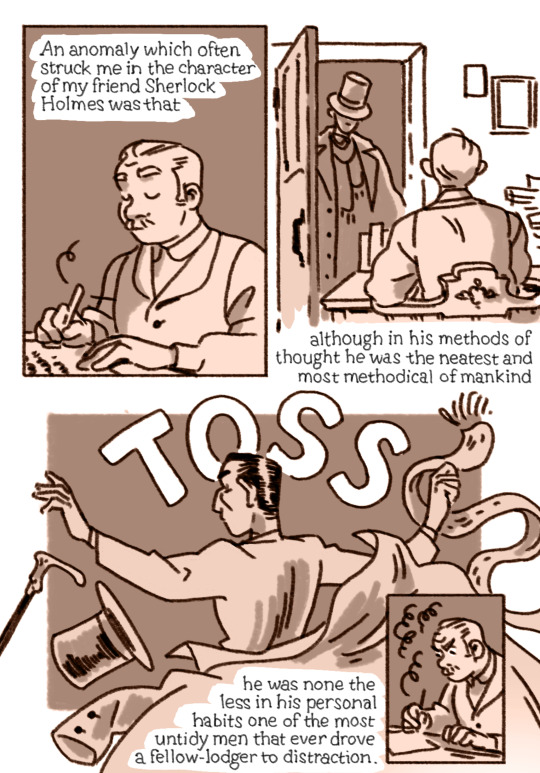
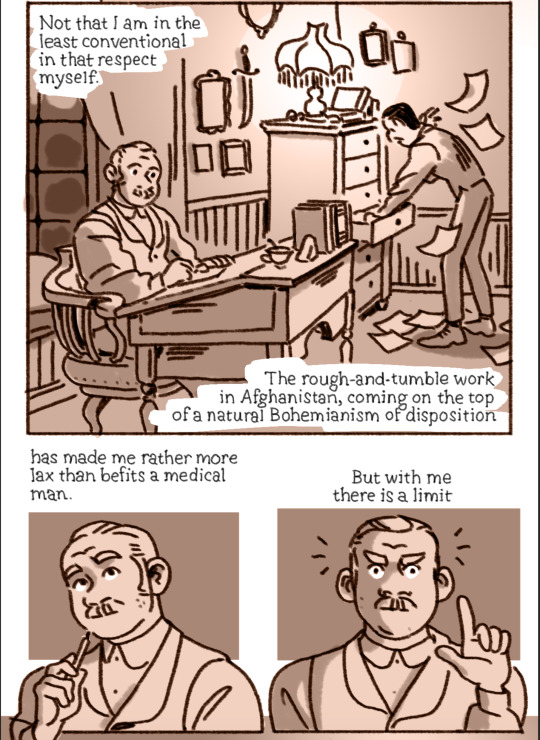
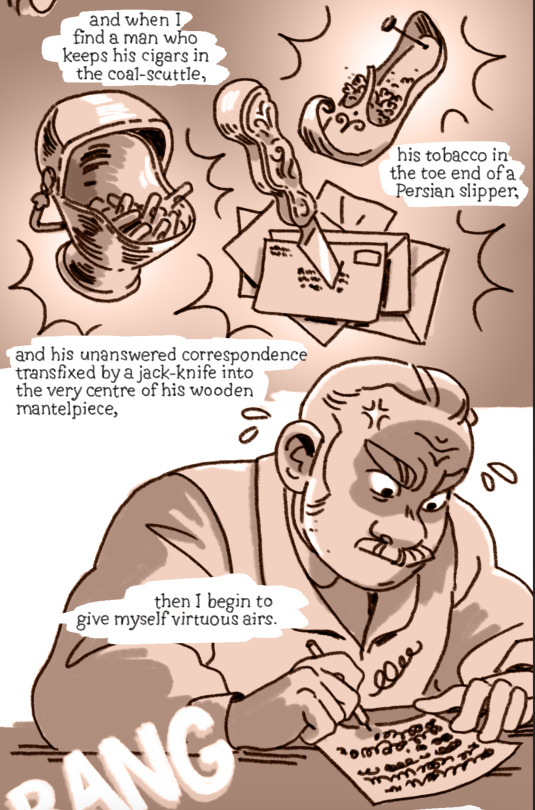

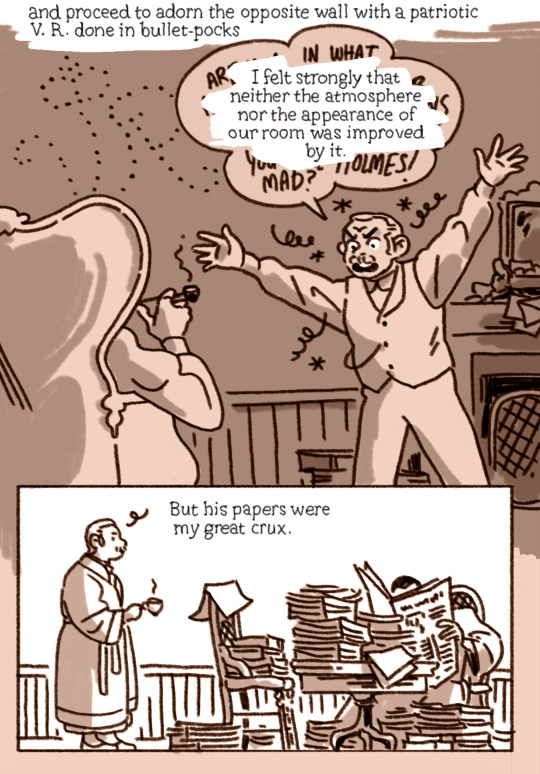
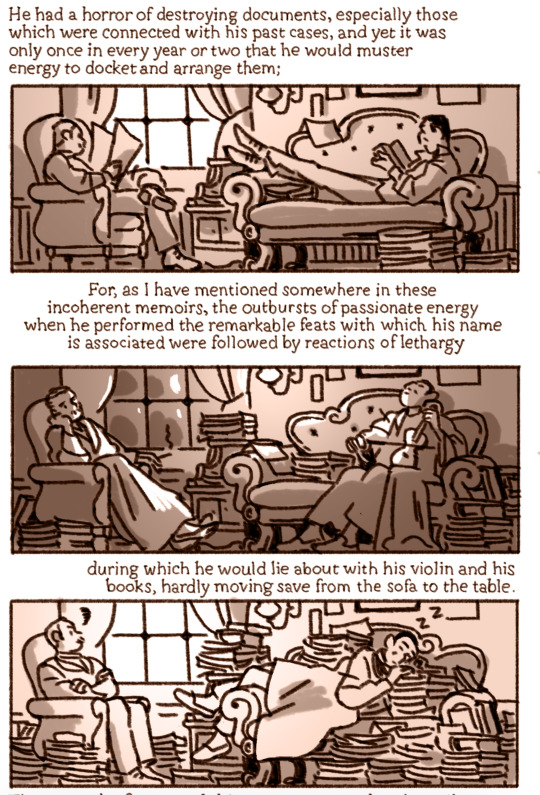
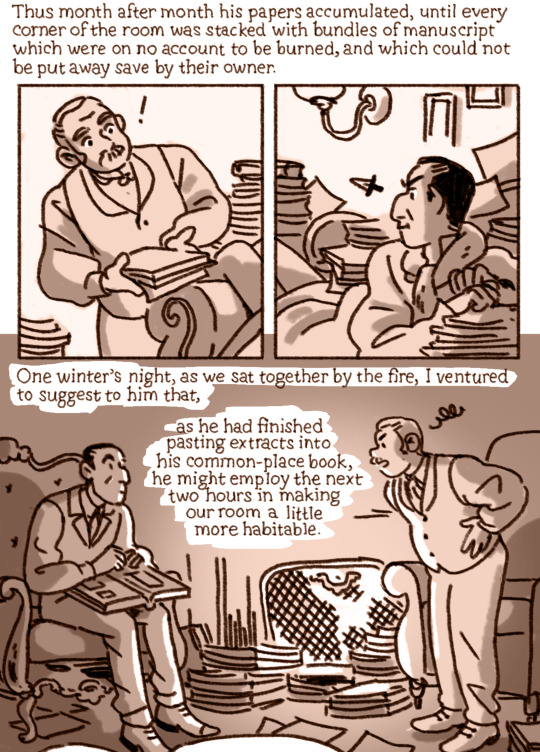
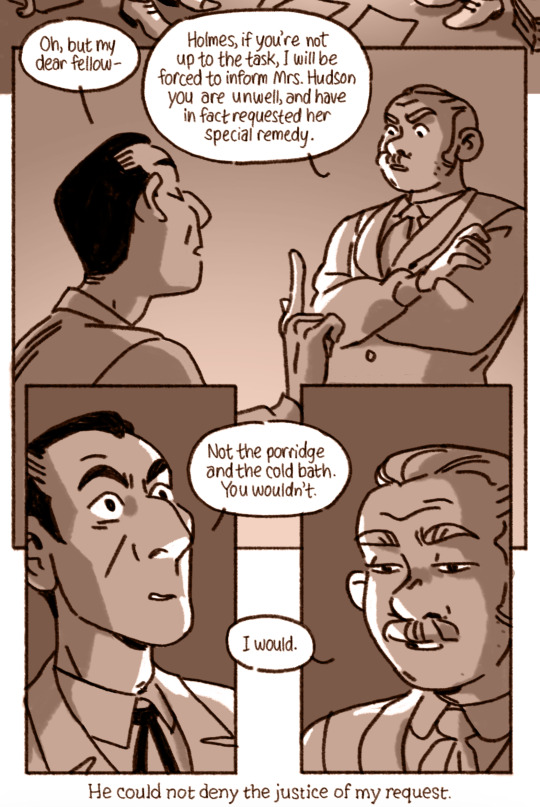
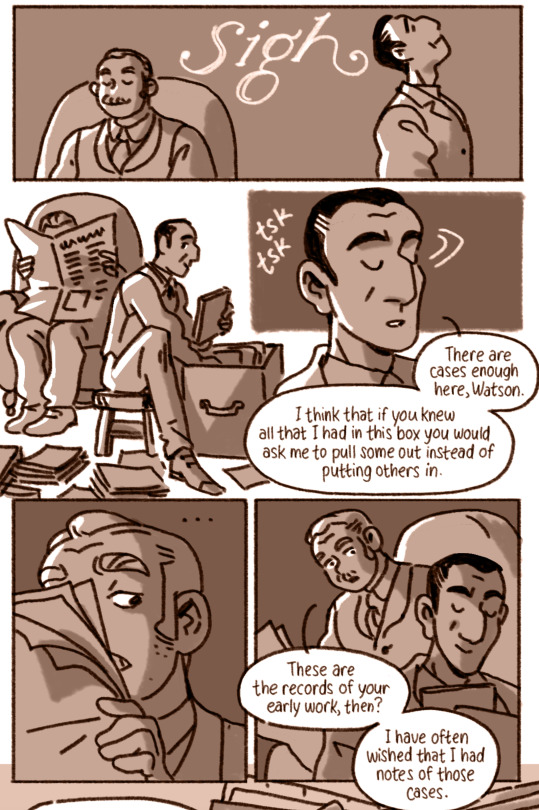
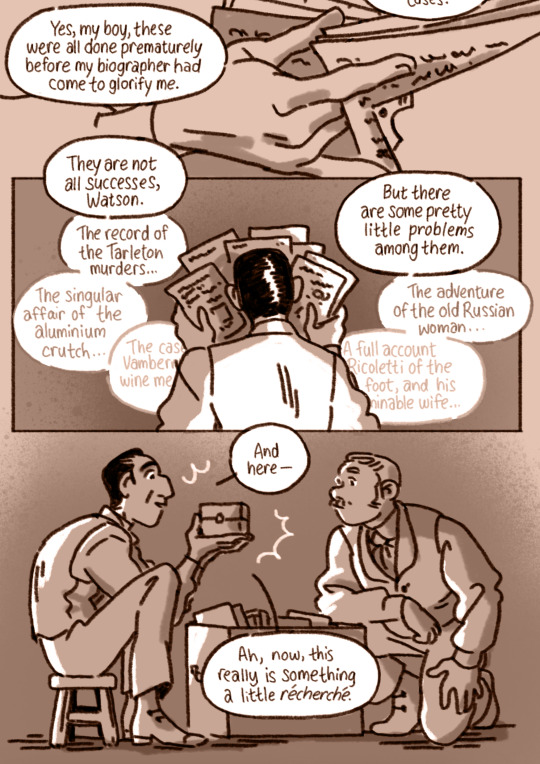
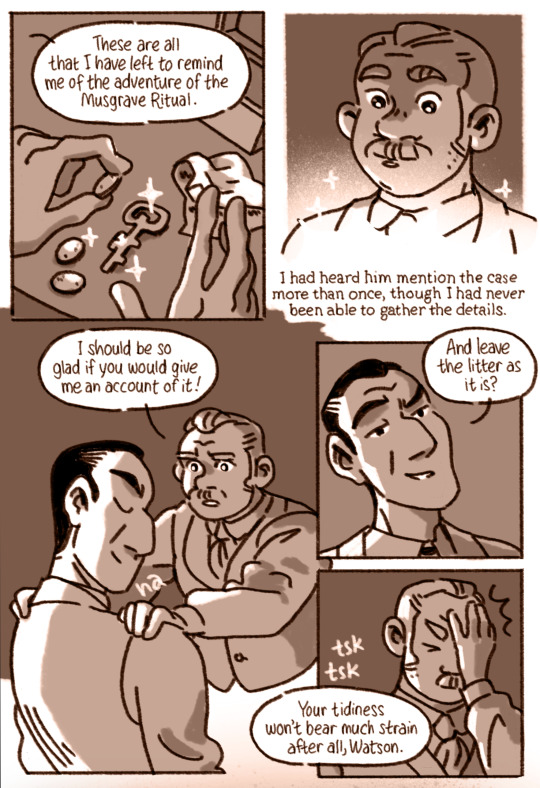
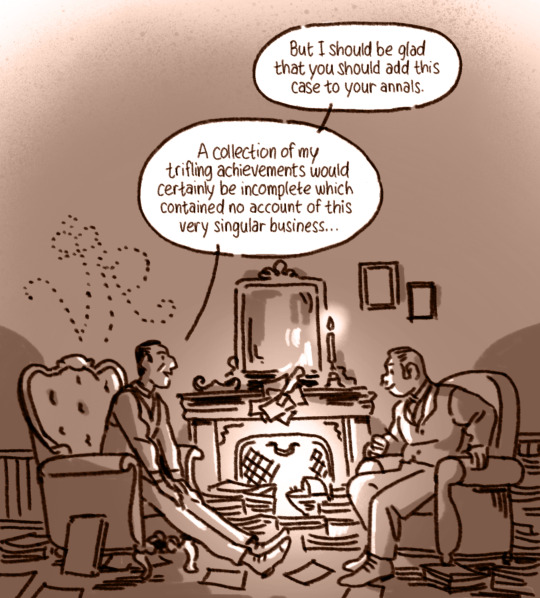
canon text under the cut:
An anomaly which often struck me in the character of my friend Sherlock Holmes was that, although in his methods of thought he was the neatest and most methodical of mankind, and although also he affected a certain quiet primness of dress, he was none the less in his personal habits one of the most untidy men that ever drove a fellow-lodger to distraction. Not that I am in the least conventional in that respect myself. The rough-and-tumble work in Afghanistan, coming on the top of a natural Bohemianism of disposition, has made me rather more lax than befits a medical man. But with me there is a limit, and when I find a man who keeps his cigars in the coal-scuttle, his tobacco in the toe end of a Persian slipper, and his unanswered correspondence transfixed by a jack-knife into the very centre of his wooden mantelpiece, then I begin to give myself virtuous airs. I have always held, too, that pistol practice should be distinctly an open-air pastime; and when Holmes, in one of his queer humors, would sit in an arm-chair with his hair-trigger and a hundred Boxer cartridges, and proceed to adorn the opposite wall with a patriotic V. R. done in bullet-pocks, I felt strongly that neither the atmosphere nor the appearance of our room was improved by it.
Our chambers were always full of chemicals and of criminal relics which had a way of wandering into unlikely positions, and of turning up in the butter-dish or in even less desirable places. But his papers were my great crux. He had a horror of destroying documents, especially those which were connected with his past cases, and yet it was only once in every year or two that he would muster energy to docket and arrange them; for, as I have mentioned somewhere in these incoherent memoirs, the outbursts of passionate energy when he performed the remarkable feats with which his name is associated were followed by reactions of lethargy during which he would lie about with his violin and his books, hardly moving save from the sofa to the table. Thus month after month his papers accumulated, until every corner of the room was stacked with bundles of manuscript which were on no account to be burned, and which could not be put away save by their owner. One winter’s night, as we sat together by the fire, I ventured to suggest to him that, as he had finished pasting extracts into his common-place book, he might employ the next two hours in making our room a little more habitable. He could not deny the justice of my request, so with a rather rueful face he went off to his bedroom, from which he returned presently pulling a large tin box behind him. This he placed in the middle of the floor and, squatting down upon a stool in front of it, he threw back the lid. I could see that it was already a third full of bundles of paper tied up with red tape into separate packages.
“There are cases enough here, Watson,” said he, looking at me with mischievous eyes. “I think that if you knew all that I had in this box you would ask me to pull some out instead of putting others in.”
“These are the records of your early work, then?” I asked. “I have often wished that I had notes of those cases.”
“Yes, my boy, these were all done prematurely before my biographer had come to glorify me.” He lifted bundle after bundle in a tender, caressing sort of way. “They are not all successes, Watson,” said he. “But there are some pretty little problems among them. Here’s the record of the Tarleton murders, and the case of Vamberry, the wine merchant, and the adventure of the old Russian woman, and the singular affair of the aluminium crutch, as well as a full account of Ricoletti of the club-foot, and his abominable wife. And here—ah, now, this really is something a little recherchè.”
He dived his arm down to the bottom of the chest, and brought up a small wooden box with a sliding lid, such as children’s toys are kept in. From within he produced a crumpled piece of paper, and old-fashioned brass key, a peg of wood with a ball of string attached to it, and three rusty old disks of metal.
“Well, my boy, what do you make of this lot?” he asked, smiling at my expression.
“It is a curious collection.”
“Very curious, and the story that hangs round it will strike you as being more curious still.”
“These relics have a history then?”
“So much so that they are history.”
“What do you mean by that?”
Sherlock Holmes picked them up one by one, and laid them along the edge of the table. Then he reseated himself in his chair and looked them over with a gleam of satisfaction in his eyes.
“These,” said he, “are all that I have left to remind me of the adventure of the Musgrave Ritual.”
I had heard him mention the case more than once, though I had never been able to gather the details. “I should be so glad,” said I, “if you would give me an account of it.”
“And leave the litter as it is?” he cried, mischievously. “Your tidiness won’t bear much strain after all, Watson. But I should be glad that you should add this case to your annals, for there are points in it which make it quite unique in the criminal records of this or, I believe, of any other country. A collection of my trifling achievements would certainly be incomplete which contained no account of this very singular business.
-The Memories of Sherlock Holmes: The Musgrave Ritual
#they are so married#also watson describing himself as bohemian#i know what you are#sherlock holmes#acd holmes#acd canon#john watson#my art#musgrave ritual
2K notes
·
View notes
Text








Historical Indigenous Women & Figures [7]:
Indiana Juliana: a Guarani woman who, along with many other Indigenous women, was captured and sold into slavery during early colonial Paraguay. She is known for killing her slaver with poison and encouraged other Indigenous women to do the same. Elsie Allen: a prominent Chief, activist, and weaver of the Pomo who worked to preserve her cultural traditions and improve education and Native rights for her community. She is considered to have been one of the three most well known basketweavers in California. Agrippina Vaganova: a famed Armenian Ballerina who developed the Vaganova method, which remains a standard textbook for ballet instruction to this day. Che-Na-Wah: Hailing from the Yurok tribe and commonly known by her English name Lucy Thompson, she was an author who was first trained to become a spiritual leader, and served her community this way. In 1916, she became the first Native American published author in California, debuting her memoir which preserved cultural teachings of the Yurok in addition to criticizing Whites for over-fishing on Native Land, and directly expressing that violence towards Indigenous peoples of California as genocide. Reina Eva: known as the Last Queen of Rapa Nui, she was also one of the last women to have received traditional tattooing. She and her husband King Atamu Tekena experienced the Annexation of Rapa Nui to Chile. Teresa Magbuana: Indigenous revolutionary who took up arms against the Spanish, winning multiple battles, and took part in all three major resistance movements against all 3 colonizers within the Phillipines. She was often called the "Visayan Joan of Arc" Tjintji-wara: a Chief, alleged sorceress, and skilled tracker of the Mantuntara people in what is now called "Australia", she also resisted colonialism with her people by killing settlers' cattle that were drinking from and polluting the water on her people's lands while they were experiencing a severe drought. Her life experiences were recorded in a book and, at one point after she had returned home from a Christian mission that had treated her for an illness, she left saying, 'too much soup! Too much Jesus!' Tonita Peña: Also known by her traditional name Quah Ah, Tonita was was a prominent Pueblo artist who was raised by her aunt, a famed Pueblo artist in her own right, she heavily influenced social change within her community, and Euro-American views of Native American art. She refused to abide by gender restrictions at the time, while at the same time highlighted women's cultural significance within her art. Her son became a famous artist himself, and her art is featured in multiple prestigious art collections, including the American Natural History Museum.
part [1], [2], [3], [4], [5], [6]. Transphobes & any other bigots need not reblog and are not welcome on my posts.
#historyedit#historical edit#women's history#history#indigenous#ndn#native american#aboriginal#aboriginal australian#justin's edits
227 notes
·
View notes
Text
A glimpse into 1929 Jerusalem under the Mandate for Palestine, from an investigative reporter at the time
This is from Days of Our Years, journalist Pierre Van Passen's 1939 memoir. He grew up in the Netherlands and Canada, then traveled the world as a journalist investigating and reporting on global politics.
It became the bestselling nonfiction book in the United States for almost two years, because it gave close-up, gripping details about world events that he couldn't report before.
Since I could not afford to be excluded from a single European country with so general an assignment, it was in my interest to remain on the good side of all the nascent censorships in Europe. Hence many things I investigated or saw remained unreported.
For example, in 1928... [about] the methods of the reactionary governments of Rumania and Bulgaria in suppressing popular movements - twelve thousand peasants and workers had been slain in Bulgaria alone that year - I could not send out a word. The police dogged our every footstep....
Correspondents like George Seldes, Samuel Spivak, David Darrah Gedye, and myself discovered only too soon that if we did speak out, we did not last very long, either in the countries in which we were stationed or in our jobs.
His account of the 1929 massacres, and the politics surrounding them, is an incredibly sharp and clear look into the roots of modern events.
There's some fascinating description of everyday life in Jerusalem, Muslim and Jewish alike, and of the various changes happening with Jewish immigration, before he gets to the Drama.
I just really enjoy seeing journalists needle rich and powerful people who are openly lying to them:










#Jewish history#Palestinian history#amin al-Husseini#jumblr#a window into the past#the original anti-Zionist
243 notes
·
View notes
Text
Ron Deibert’s “Chasing Shadows”
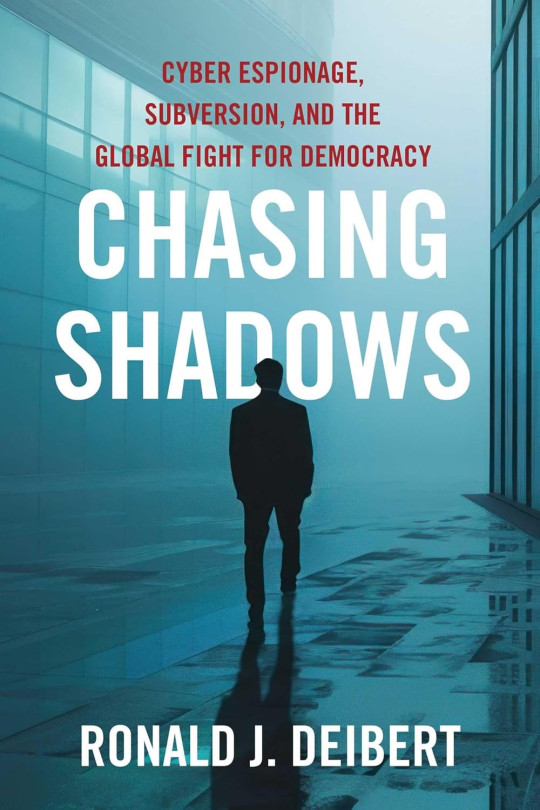
If you'd like an essay-formatted version of this post to read or share, here's a link to it on pluralistic.net, my surveillance-free, ad-free, tracker-free blog:
https://pluralistic.net/2025/02/04/citizen-lab/#nso-group

Since 2001, Ron Deibert has led Citizen Lab, the world's foremost "counterintelligence group for civil society," where they defend human rights activists, journalists and dissidents from the digital weapons deployed by the world's worst autocrats and thugs:
https://citizenlab.ca/
Citizen Lab's work is nothing short of breathtaking. For decades, this tiny, barely resourced group at a Canadian university has gone toe to toe with the world's most powerful cyber arms dealers – and won.
Today, Simon and Schuster publishes Chasing Shadows, Deibert's pulse-pounding, sphinter-tightening true memoir of his battles with the highly secretive industry whose billionaire owners provide mercenary spyware that's used by torturers, murderers and criminals to terrorize their victims:
https://www.simonandschuster.com/books/Chasing-Shadows/Ronald-J-Deibert/9781668014042
Mercenary spyware companies are based all over the world, but the global leader in providing these tools is Israel, where the signals intelligence Unit 8200 serves as a breeding ground for startup founders who grow wealthy serving dictators around the world, thanks in part to Israel's lax export standards for cyberweapons.
Most notorious of these companies is the NSO Group, whose Pegasus malware has been deployed by corrupt, narco-affiliated Mexican politicians, murderous Saudi royals, and dictators in Central Asia, Latinamerica, and all around the world.
The NSO Group's founders told their customers that they were invisible, as ethereal as shadows, so their products could be deployed without fear of detection or consequence. At the same time, NSO ran a disinformation campaign for the broader public, insisting that they have the highest ethical standards and closely monitor their products' use to ensure that it is only deployed against terrorists and serious criminals. This latter strategy is backstopped by harassment and intimidation of journalists who investigate this narrative – I have personally been threatened by lawyers retained by the NSO Group.
Diebert and Citizen Lab disprove both of NSO's narratives. Their technical staff developed incredibly clever, subtle methods to detect malware infections all around the world and identify who had been targeted by NSO's products (they were greatly aided in this by farcical blunders in NSO's products).
In so doing, Citizen Lab not only showed that customers for mercenary spyware will someday be discovered – they also thoroughly disproved the company's narrative about its squeaky-clean image and high morals.
Much of Deibert's book is a true-life technothriller recounting the technology, the politics, and the human cost of a largely unregulated industry whose protectors are among the most powerful people in the world.
This book contains many never-revealed revelations from Deibert's distinguished career, like notes from a meeting where Stephen Harper's top spooks and Privy Council officials threatened and intimidated Deibert over Citizen Lab's reports on Saudi Prince Mohammed Bin Salman's use of spyware on Canadian residents.
Deibert also reveals some juicy bits of less consequence, like the fact that it was he who tipped off the BBC's Rory Cellan-Jones that Research In Motion was helping Middle Eastern autocracies and India's far right government spy on dissidents' Blackberry devices, just minutes before RIM co-founder Mike Lazardis was to sit for a televised interview with Cellan-Jones for the BBC's Click. When Cellan-Jones asked Lazaridis about the matter, Lazaridis at first denied it, then demanded that the camera be turned off before halting the interview:
https://www.youtube.com/watch?v=Q6iGe7vuGeQ
But the majority of Deibert's book is a string of horrifying stories of dissidents, activists, journalists, opposition politicians and the people around them having their lives peeled open by companies like NSO Group and their competitors. They run the gamut from multiple, successive presidents of Catalonia to the US-based children of activists agitating for limits to sugary drinks in Mexico.
On the way, Deibert is hounded by all kinds of dirty-tricksters, like the bumbling ex-Mossad spook that Black Cube – whom Harvey Weinstein hired to harass his victims – hired to discredit the organization:
https://www.nytimes.com/2019/01/28/world/black-cube-nso-citizen-lab-intelligence.html
He's also chased by troll armies working on behalf of South American despots, the corrupt Modi government of India, and middle eastern autocrats in the UAE, Saudi Arabia and elsewhere. While most of these trolls are anonymous jerks, a few high-profile serial online harassers-for-hire are singled out by name, their deeds publicly connected for the first time.
Deibert shows the human impact of mercenary spyware: the connection between these companies' products and intimidation, arbitrary detention, punitive rape, torture, and murder – for example, he painstaking lays out the role that the NSO Group's products played in the murder and dismemberment of the US-based journalist Jamal Khashoggi.
This is a dirty business, but it's also a lucrative one. Citizen Lab goes eyeball-to-eyeball and toe-to-toe with farcically wealthy, well-resourced attackers, who've waxed fat by abetting corruption and sadistic greed.
But this isn't mere rage-bait. Deibert's story is an inspiration, both in how it shows how principled, decent, hardworking people can make a difference – Citizen Lab researchers repeatedly discover and burn the vulnerabilities exploited by mercenary spyware, a process Deibert likens to disarming them – but also in the bravery and resilience of the subjects who trust Citizen Lab to analyze their devices, risking everything to come forward and tell their stories.
Citizen Lab is enmeshed in a global, digital community of human rights defenders – a community that wouldn't exist without the internet. Deibert's life's work is to create an internet that is fit for human thriving – and to wrestle control of technology away from the monsters who project their greed and sadism around the world through our devices.
#pluralistic#reviews#cybersecurity#security#infosec#spyware#mercenary spyware#citizen lab#cdnpoli#israel#sigint#human rights#digital rights surveillance#books#gift guide#university of toronto#ron deibert
132 notes
·
View notes
Note
Hi turk here! I live around people who do not believe the genocide happend and I'm kind of losing my mind (my history teacher believes it is propaganda and ottomans would never do that because you know they are so peaceful). I don't know how to convince these people. Do you know maybe literature about the genocide that they could read? Maybe this will convince them. I keep telling them there is proof and eye witnesses but they don't believe it because it's not 'turkish'. If you answer thank you in advance and I hope you have a good day( ◜‿◝ )♡
I know exactly what you’re talking about; I've had the misfortune of encountering genocide deniers too. Their heads are made of stone — nothing gets through. Whatever evidence you show them, they’ll just say it’s fake. Photos? “They’re staged.” Survivor testimony? “They’re lying.” Eyewitness accounts from non-Armenians? “They’re all part of a conspiracy.” You could even show them documents written in turkish by turkish officials, and they'd still twist it or say it’s fabricated. I honestly believe that even if they had seen the genocide with their own eyes, they would still deny it. That kind of willful blindness comes from a place beyond ignorance; their souls are lost, and their brains are eaten.
That said, if you still want to try, you can look into the works of Taner Akçam, a Turkish historian who’s written extensively about the Armenian Genocide. His latest book is Killing Orders (2018), which includes Talaat Pasha’s telegrams giving orders for the massacres — these telegrams are damning. Some of them have been published on my blog as well. Here’s a short lecture of his you might find useful to share.
You can read "Memoirs of Count Bernstorff", who was the german ambassador of the Ottoman Empire in 1917. In his memoirs, Bernstorff recounts a conversation with talat pasha after the genocide had been committed: "When I kept on pestering him about the Armenian question, he once said with a smile: 'What on earth do you want? The question is settled, there are no more Armenians.'"
In the recollections of the U.S. ambassador Henry Morgenthau, talat is quoted saying: "It is no use for you to argue . . . we have already disposed of three quarters of the Armenians; there are none at all left in Bitlis, Van, and Erzeroum. The hatred between the Turks and the Armenians is now so intense that we have got to finish with them. If we don't, they will plan their revenge." Here's the book, recalling his years working in turkey.
The turkish novelist Halide Edip wrote in in 1918: “We slaughtered the innocent Armenian population… We tried to extinguish the Armenians through methods that belong to the medieval times”. [source article]
"God will punish us for what we did [Allah bize belasını verecektir] … the matter is too obvious to be denied. I personally witnessed this Armenian occurrence in the port city of Ordu [about 155 km west of Trabzon]. Under the pretext of sending off to Samsun, another port city on the Black Sea [about 255 km west of Trabzon], the district's governor loaded the Armenians into barges and had them thrown overboard...", wrote Hafız Mehmet, Trabzon Deputy and Justice Minister in the Republic of Turkey. ["My Turkishness in Revolt", Taner Akçam]
In a 28 November 1918 issue of the Hadisat newspaper, turkish poet Suleyman Nazif wrote: "Under the guise of deportations, mass murder was perpetrated. Given the fact that the crime is all too evident, the perpetrators should have been hanged already."
Hasan Mazhar, Governer of Ankara: "When I received orders from the Ministry of the Interior regarding the deportation of Armenians I pretended not to understand. As you know, other provinces were done with the deportations before I had ever started. Then one day Atif Bey came to me and orally conveyed the interior minister's orders that the Armenians were to be murdered during the deportation. "No, Atif Bey," I said, "I am a governor, not a bandit, I cannot do this, I will leave this post and you can come and do it."" [A shameful act: the Armenian genocide and the question of Turkish responsibility, Taner Akçam]
Here's another useful article.
The famous writer, winner of the Nobel Prize in literature, Orhan Pamuk has talked about the Armenian Genocide and the denial policy by the turkish government. (For this, he had been forced to flee the country)
And just so you know, I’m really glad people like you exist. It takes a lot of courage to stand up for truth in an environment like that. Thank you for speaking out. I hope you have a good day too. Be safe.
68 notes
·
View notes